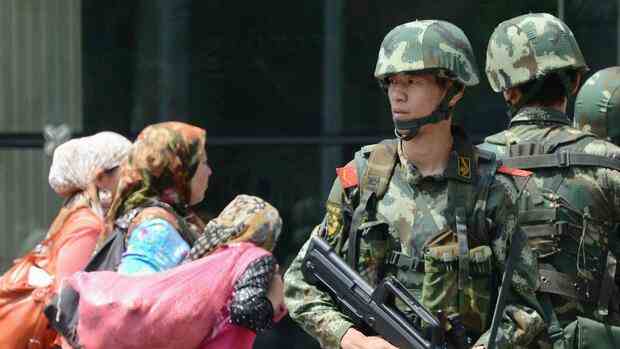The Uyghurs are systematically oppressed and en masse sent to forced camps.
(Photo: imago/Kyodo News)
Berlin Even the title of the book is grim: The High-Tech Gulag – China’s crimes against the Uyghurs. There is also an image of two women being targeted by surveillance software. The Chinese government is accused of having security authorities and the provincial government commit massive human rights violations on their behalf in the region – Beijing denies this. In his book, Mathias Bölinger describes in detail how this is done and how the ever more massive oppression of the Muslim minority came about.
The sinologist was a correspondent for various media in China for years, speaks fluent Chinese and is one of the few German-speaking journalists who has traveled regularly to the western Chinese province of Xinjiang for years. At the same time as Bölinger, the author of this text was also a correspondent in Beijing and got to know him personally there.
Contrary to what the attention-grabbing title might suggest, the book goes far beyond simply describing the most dramatic form of the oppression of the Uyghurs in China – the mass incarceration in detention camps, where inmates are subjected to brute force and blunt indoctrination. Rather, the author has also written a comprehensive overview of how the Chinese state deals with ethnic minorities in China and where it originated. At the same time, Bölinger, who is now the correspondent for Deutsche Welle in Kiev, always remains pleasantly calm and matter-of-fact.
The book benefits from the author’s extensive historical knowledge and deep knowledge of the Chinese one-party system. The first part of the book goes into detail about the turbulent history of Xinjiang. For example, today’s Chinese province was a “puppet state” of the Soviet Union in the 1930s. Ethnic groups were meticulously determined and people’s affiliations were used to promote them or keep them out of decision-making positions at will.
Inconceivable today, there were still numerous Koran schools in Xinjiang in the 1980s. In the course of the student protests at the end of the 1980s, young people in Xinjiang also increasingly turned away from the Chinese state and towards their religion and culture. On April 5, 1990, there was a showdown between militant religious groups and the state – it was the first of many, as Bölinger writes, and the beginning of massive repression in the region.

Mathias Bölinger: The High-Tech Gulag
CH Beck Verlag
Munich 2023
256 pages
18 euros
The author describes how the situation kept escalating. After multiple attacks in Xinjiang, the already repressive measures against people of the Muslim faith were tightened, which led to further radicalization. The Chinese state responded with even tougher restrictions.
While the first part of the book is sometimes a bit too difficult to read due to the historical flashback, the second part deals more with personal fates and is closer to the current situation in Xinjiang. Bölinger spoke to those affected in exile and evaluated the numerous leaks from the Chinese authorities in recent years.
He describes how the security apparatus systematically identifies people in the region as potential troublemakers for the slightest reason using modern technologies and puts them in camps, where they are then subjected to violent attacks and inhumane treatment.
Bölinger’s book is also a plea that it’s worth taking a closer look and repeatedly calling the Chinese government to account for its serious human rights violations in the region. “Many individual fates show that it was precisely the concern about the international reactions that led to inmates being released and able to leave the country.”
According to Bölinger, diplomats and observers have long described how international attention for certain cases often leads to noticeable improvements for those affected. Most of these are not immediately visible, but it is often shown: “In the long term, pressure and attention from abroad have an effect.”
More: Total Surveillance and Repression: China’s Dangerous Transformation
